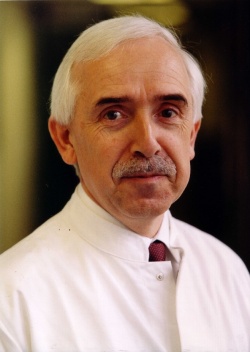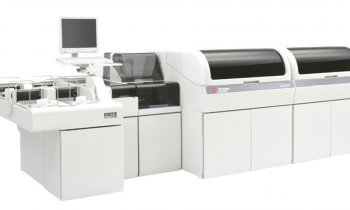The IFCC WorldLab and EuromedLab Congress
‘Three years is a long time in the world of research. The amount of information on offer quickly grows quite enormously,’ says Professor Rudolf Tauber, joint head of this year’s WorldLab congress with Professor Harald Renz. Thus, one organisational challenge was to channel current trends and developments and present participants with an informative, comprehensive overview. How was this achieved?
Interview: Meike Lerner

During the congress in Berlin (15-19 May), four distinct topics will be discussed in great detail during the daily plenary sessions: Molecular tumour markers, clinical and diagnostic immunology, neurodegenerative diseases as well as new methods and procedures in laboratory medicine, Prof. Tauber explained. ‘With molecular tumour markers, the focus is on the early diagnosis of malignant tumours. New findings in molecular biology – key words epigenetic tumour markers and micro RNA – give cause for hope that we’ll be able to develop new screening parameters in the future which will make diagnosis possible at the very early stages of diseases.’
Autoimmune diseases will be the main topic in the field of clinical and diagnostic immunology. ‘Early detection is also a
key word here – the earlier treatment can begin, the better the results. Other hot topics are individualised therapy and reprogramming of wrong immune responses – both areas where intensive research is currently being carried out.’ Intensive discussion will also focus on one of the big challenges in coming decades -- neurodegenerative diseases. ‘The objective is not only to develop new treatments – such as for Alzheimer’s – but also to research new biomarkers for diagnostics to facilitate early detection and monitoring of the effectiveness of treatment.’
New methods and procedures
Next generation sequencing enables the sequencing of the entire genome within hours. ‘Procedures such as this, which are currently finding their way into research and development, will allow us to analyse genetic risk factors for diseases, or groups of diseases, for the individual patient in the near future. Next generation sequencing will take diagnostics as well as prevention to a completely new level, the consequences of which we cannot yet quite grasp in its entirety. It will form the basis of customised treatment procedures, which in return could revolutionise the entire world of healthcare.
Analytical procedures such as mass spectrometry and the decoding of the proteome, i.e. the entirety of all proteins, as well as of the metabolome, i.e. the entirety of all metabolites, are also vital. The scientific programme and the large industry exhibition at the IFCC WorldLab Congress will give an outstanding overview over all new developments.’ Laboratory medicine’s clinical impact ‘Laboratory medicine and its related disciplines provide around 60% of the information decisive for a diagnosis. With the increase in the identification of pathomechanisms and increased understanding of the genetic causes of diseases, laboratory medicine will become increasingly important for the field of prevention. The same goes for therapy: In the future we will be better able to monitor the use of certain drugs as to their benefit for the individual patient. The entire field of personalised medicine would not be possible without laboratory medicine.’
Future challenges
‘Scientific activity must be extended – what we need is an active and committed science that aims to understand the molecular causes of diseases. Monitoring the clinical benefit of all new procedures and new biomarkers will play an essential role. Therefore, we must check how new procedures and parameters can be integrated into in- and out-patient care. And finally, we must also intensify training of academic and non-academic staff. The challenges that go hand in hand with the introduction of new technologies can only be mastered through consolidation of training.’
26.04.2011











